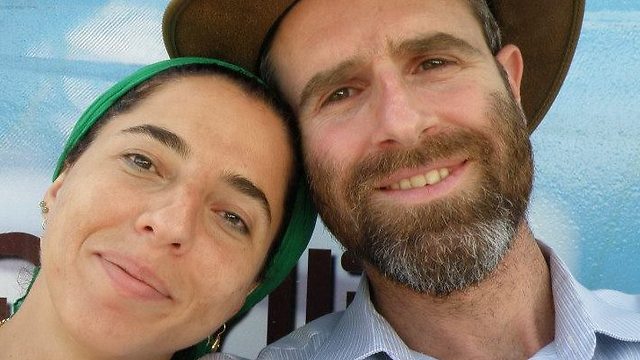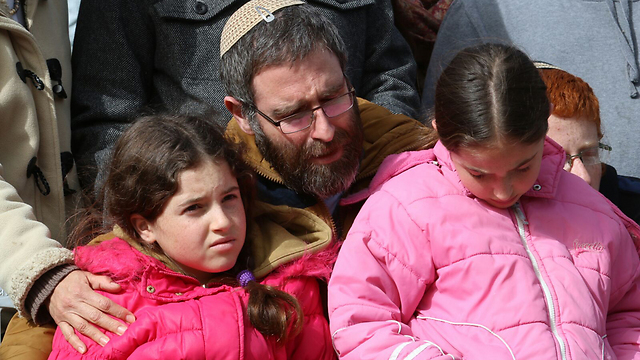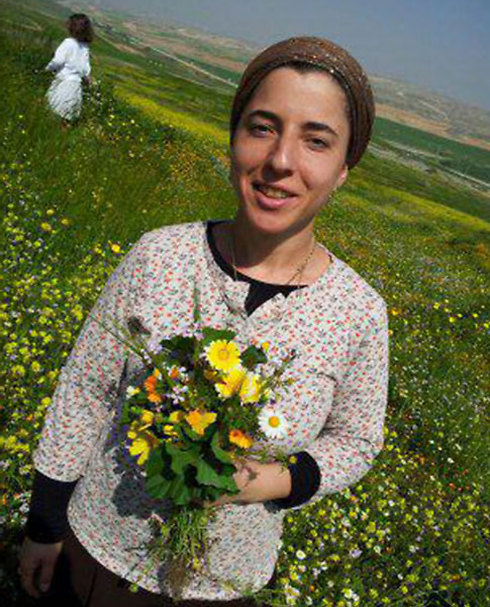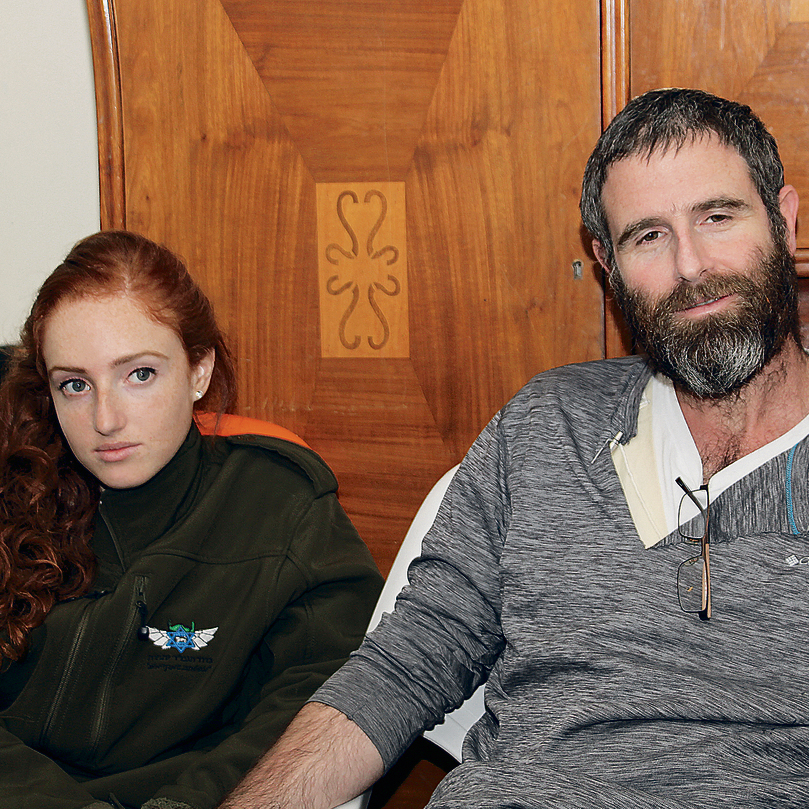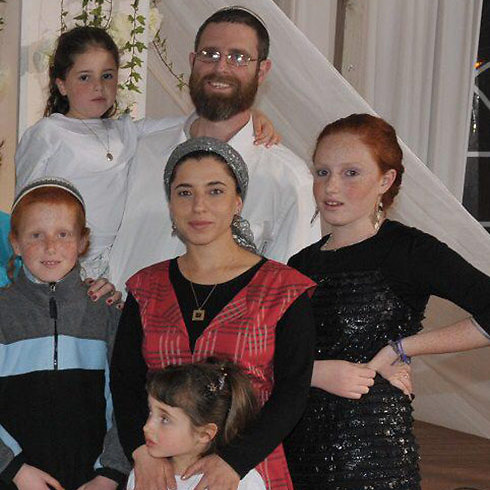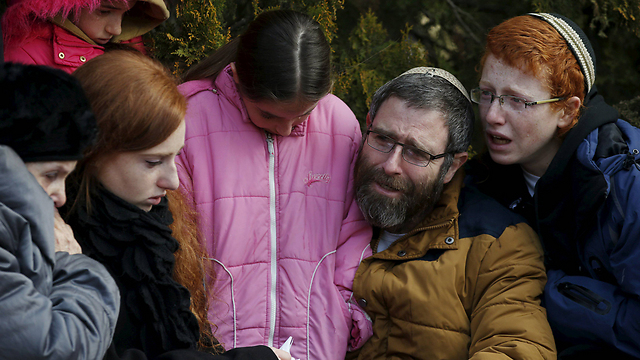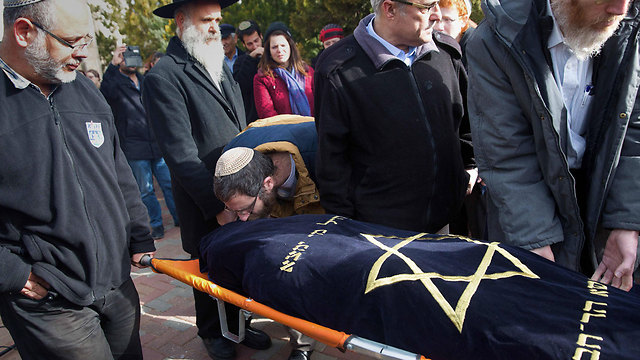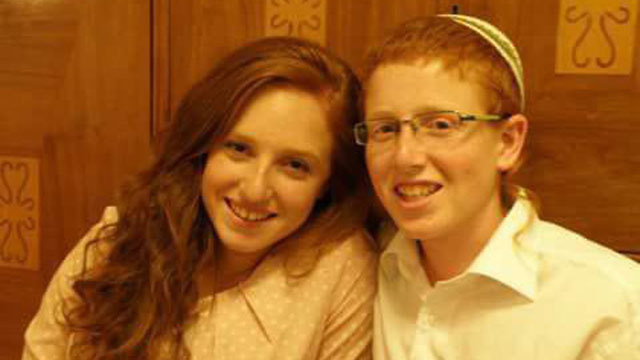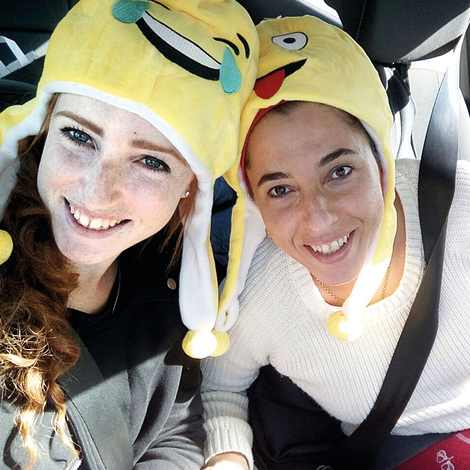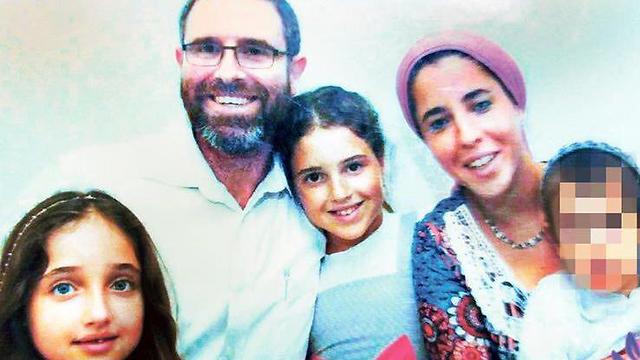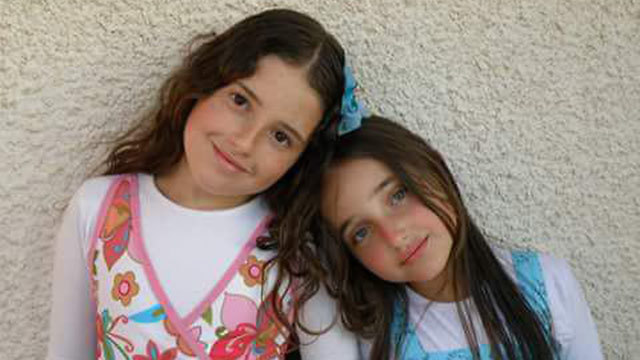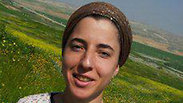
'Mom is in my heart,' says foster son of slain Israeli woman
'This is the first time I have a home of my own,' said Dafna Meir when she first moved in with her husband. She was murdered by a teenage terrorist on the threshold of that home in Otniel earlier this week. But while Dafna went through life with humor and unending energy, she wasn't afraid to die.
The door of the Meir family home in Otniel is painted intense blue. The fresh paint is vivid and full of life. Mother Dafna, with uncontainable joy, painted the door herself, energetically stroking the brush and softly singing as she worked. On Sunday this week, she moved on to painting the doorpost white. And then, on the threshold of the home, her holiest of places, she was stabbed to death. The pure white was stained with red blood.
"Dafna painted the door after we made a barter," Tehiya Hillel, a friend and close neighbor, says. "She, as the great priestess of thousands of women in everything to do with sexuality, femininity and relations, taught me about fertility, and I, as an amateur stylist, helped her redecorate the house. We went through each room, and together with the children and the father Natan, she planned what to redo in each of them. She also had moments in which she cried when she had to get rid of sentimental objects from her past. It was an amazing process. The physical structure of the house, just like anything else for Dafna, had spiritual meaning. Redecorating it was not something technical for her; it was yet another layer in life, after her skin and clothes. Especially as this house, which she built with Natan, was the first home that was truly hers."
Behind the blue door the husband now sits. He's surrounded with Dafna's heartbroken friends, army friends, friends from the yeshiva, neighbors, and even strangers, who came from far and wide to bow their heads and take in something of her strength. Natan asks for the consolers' names, hugs them, and personally thanks anyone who comes to share the pain. And just like the life he built with his wife, a life of a deep and complex connection between contradictions, he cries and laughs, laughs and cries.
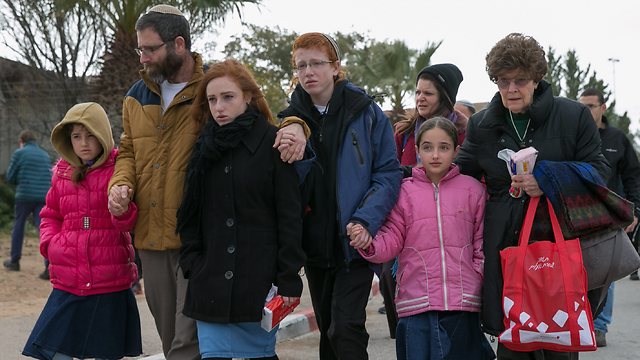
"One of the first things I asked the children after the murder was whether they were angry," he says, suddenly serious. "But not one of them expressed anger. I'm not angry either. This isn't the language we speak. Dafna had a friendship with Dr. Ahmad Nasser, a young Arab doctor she worked with as a nurse in Soroka. He called to ask if he could come to offer his condolences. I was a bit offended. We're people of peace; we are lovers of man, and lovers of life. It bothers me that I even have to explain it. Our home is open for all, all are invited, you don't even need to ask."
Dafna and Natan are not rare birds in Otniel. The settlement, which numbers 150 families, is characterized by spirituality and social openness. In the days before the current wave of terror, the community's leaders worked to build a joint industrial area with the nearby villages of Yatta and Dahariya, but the violent attacks put a hold on the plans for local peace.
"One of my best friends is Otniel's Arab tractor driver, the man responsible for all the earthworks in the settlement," Natan says. "We're the same age, married in the same year and our children are the same age. I convinced him not to marry a second wife and promised him I won't marry a second wife either. For a while I worked in construction, that's when the connection was made. I came to his village. There was one really funny incident. He's a giant, really big guy, and he tried to grab me from behind and scare me. I had two bags of sand in my hands and I poured it all over him, and we both wrestled and couldn't stop laughing. He's a real friend, not just any guy. When we needed to raise money for the kindergartens here in Otniel, I went to him and asked him to donate, and he gave several thousands of shekels just because I asked and I'm his friend. I'm sure that if he had met the terrorist, he would've killed him on the spot for daring to stab Dafna."
Natan is uncomfortable with the journalists around him. He stresses that he's not giving interviews; he's sitting shiva, and invites the reporters to be part of it, to console, to talk about his wife without any poses or pretense, without putting on a sad face for the cameras. "I realize that Dafna is no longer just my Dafna," Natan says. "It hurts and it's emotional. Once, there was a photo of her in one of the women's magazines and she was so excited, she was really stoked with herself. I told her, 'Dafna, why do you need this?' But she loved it, wanted to be famous."
How did you meet her?
"It's a romantic story, prepare the tissues. We met at an army post in southern Lebanon. I was sent there as a medic in a field unit. I was told there was a religious female soldier there, an Air Force lookout. Poor thing, looking at the blue sky all day and all night looking at the dark sky through a night-vision machine. Very boring. I was also somewhat of a religion NCO there, because the scouts kept made the kitchen traif (non-kosher).
"Ahead of Passover, there were a lot of issues of kashrut, and I was looking for the religious soldier to update her on the details. I remember I hardly dared look at her, a yeshiva student like me, a goodie two shoes. I showed her where the synagogue was. Synagogue? More like a little tent. I told her I was there every now and again and that she was welcome to come, if she needed to ask me anything. Dafna really did come to the synagogue tent, and after that guarded with me for half a shift. I fell in love with her instantly, head over heels. Such a small soldier, with a lot of energy and a mane of rebellious curls. When she left the post it was horrible, really depressing, to stay alone for the rest of the guarding shift."
Shortly before Seder night 19 years ago, Natan asked Dafna where she planned to spend the holiday. The young soldier said the plan was to find a retirement home of some sort and offer to volunteer there. Natan, however, made it clear to her he wanted her to come spend the holiday with him.
"I realized this was a lone soldier, who had nowhere to spend the holiday, and of course I also wanted to be close to her. She really did come over for Seder night, and after the holiday we went on a walk, and it was already obvious to both of us that it was forever. I told her that for the sake of my punctilious parents we won't talk about marriage just yet, we'll give them some time to get used to the idea," he laughs again, despite the pain.
One of their friends from the army remembers how love blossomed between the two. "It was a time when Natan was completely losing it, he would forget to show up for guard duty. All he did was spend time with Dafna. Natan was happy, but we suffered."
"When my father saw my cellphone bill, he said it would be better if we got married. So we did," Natan continues. "We came here, to Otniel. I went to yeshiva here. I remember Dafna walked into the house and told me, 'This is the first time I have a home. A home of my own.' She had an old bag, with some personal items she would take everywhere. That's all she had. She once told me how someone threw the only doll she had out the window."
Going toe-to-toe with a rabbi
Dafna, the youngest child with two older brothers, had a difficult childhood. When she was five, her father, a Holocaust survivor, left home. Her mother kept raising her, but when she was 10 she was taken away to boarding school. Two years later she arrived at the Tirat Zvi kibbutz and that's where she lived until she joined the army. During that time, the kibbutz found her a host family from central Israel. The Muati family invited her over for holidays and Shabbats and as the years went by, adopted her.
After they got married, the couple had four children: Renana, 17, Akiva, 15, Noa, 11, and Ahava, 10. The pregnancies, and giving birth, were not easy for Dafna. When she had Renana, Natan says, Dafna's life was in real danger. Five years ago, the couple decided to fulfill a condition Dafna made when Natan asked for her hand in marriage. They decided to give a home to two foster children, brothers - Nadav and Itay (in accordance with the law, these are not their real names), who were three months and a year and a half old at the time, and are now five and six and a half.
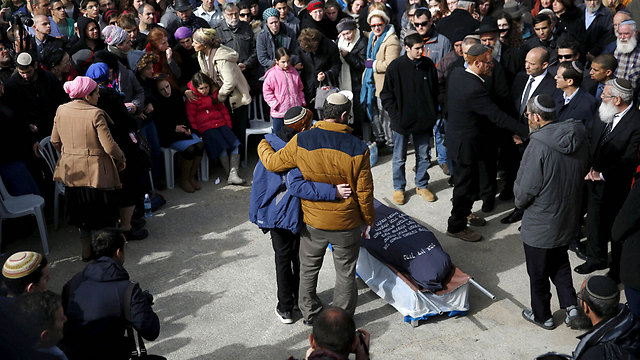
"I remember when mom and dad came to ask us, the children, if we were okay with taking in Itay and Nadav," says Renana, who has orange hair and green eyes, and whose intense look and honesty are echoes of her mother. "It was after we passed the entire process and all of the trials for potential foster families. I was the only one among the children who didn't immediately say yes. I wasn't sure I wanted this, that I had the ability in me to open up our small family to others. After a while, I said yes, that I wanted it and agreed to it, and now they're the light of our lives. They bring so much joy to us. Yesterday, when dad gathered all of us, the children, for a talk, the first question we asked was whether they'll take Itay and Nadav away from us. I don't want them to be taken away. We'll keep taking care of them. Dad will keep taking care of them and we're going to help him."
Pnina Gefen, one of Dafna's close friends, says she was a great mother. "The girl who didn't know what home was has built, along with Natan, a palace of plentifulness. She taught herself how to be a mother and knew she was a good mother. Her WhatsApp status was 'the number one mother in the galaxy.' This wasn't vanity; it was her recognizing her own self-worth. She loved herself, learned how not to be critical of herself. She had the ability to forgive herself and others."
Natan remembers such forgiveness. "There was a tradesman that caused us a lot of damage," he says. "Dafna spent days convincing me to forgive him. In the end, I didn't have a choice and I forgave."
Dafna also found the strength to forgive her father. When he was on his death bed, the two got back in touch and she took care of him with great devotion until he passed away three years ago.
But Dafna also knew how to fight for the things she believed in, even when faced with great obstacles. As part of her work helping women with fertility and her belief in a natural lifestyle, she fought for the right of women trying to conceive to dip in the mikveh during the "seven clean days," rather than take hormones to postpone ovulation. When she heard a well-explained halacha ruling that allows women to dip in the mikveh earlier in the month so they could conceive, she told all of her patients about this option. One of the expert rabbis in the field severely rebuked her for this, and claimed there is no important rabbi that allows this.
And this is what Dafna wrote him in response: "I don't differentiate between important and non-important rabbis. I don't have a 'wise-o-meter.' As far as I'm concerned, a rabbi who deals with rabbinate work, who received his ordination honestly, follows God's ways and observes his commandments, is a rabbi for all intents and purposes. And a real rabbi that allowed ... God is with him, and so if there is a sin committed, it's on the rabbi, not the couple or the child. That's why I convince people to turn to a rabbi. All of this hatred and condescending that rabbis express towards one another is the biggest and most regretful Chillul Hashem there is in the world. And this I write you with tears. Please, humbly accept this admonishment, which is an unfortunate truth... there is a Lord in heaven who protects me of any slander. And everything is always for the best."
The same rabbi responded to Dafna with these words: "I will advise you, from the bottom of my heart and out of a true desire to only help you, not to take upon yourself permissions relating to kareth and half a kareth (offenses whose punishment is death for the offender and his seed - YE). You have too many good purposes to meddle with such things."
Dafna replied to him with no hesitation, in her own special way: "I don't take anything upon myself. I am not a rabbi. I answer to those who ask me that such permission exists, that there are rabbis who allow it. And I refer them to these rabbis, because to my understanding, it's better for a 'non-important' rabbi to give them that permission, than for them to not have children at all... It's a good thing that there are rabbis willing to endanger their next life for their flock in this life. I don't think God will let these rabbis burn in hell. Nor me - who sent couples to them... in general I'm a good woman who does mitzvas every day. A good woman to my family, my husband, and my children, I treat patients at intensive care in Soroka, raise two foster children at home, in addition to my own children. And I'm not worried about receiving a kareth punishment. God loves me very much. And I definitely don't put much stock when other people, no matter who they are, tell me that I'm at risking of receiving a kareth punishment. I don't talk to people like this, and don't believe in talking like this. You have to try to be good. And that's it."
Natan remembers the day he learned of these exchanges. "When I saw some of the correspondence, I grabbed my head in despair. As a yeshiva student, I wasn't used to talking to rabbis like this. But that was Dafna. And in the end that rabbi sent women to her, because he knew she was the most professional, and Dafna wouldn't stop defending him and saying how much he was doing everything out of piety."
Her unique character was also expressed in her work at the Neurosurgery Department in Soroka. Alongside her deep bonds with her coworkers, both Arabs and Jews, Dafna had exceptional ties with the patients and their families.
"She taught herself Arabic and Russian, and was able to have proper conversations in both of these languages," says Dafna's friend Hillel. "Dafna believed in her ability to communicate with people who suffered head trauma through their spirit. She had full conversations at the hospital with patients who were not conscious. There was one patient who was in a coma for eight months. He was transferred from there, was rehabilitated, and came back to visit the department. When he met Dafna he told her, 'I remember you. I remember your voice. You're the nurse whose shift I waited so much for. You'd sing and talk to me. You kept the flame burning and pulled me back to this world.'
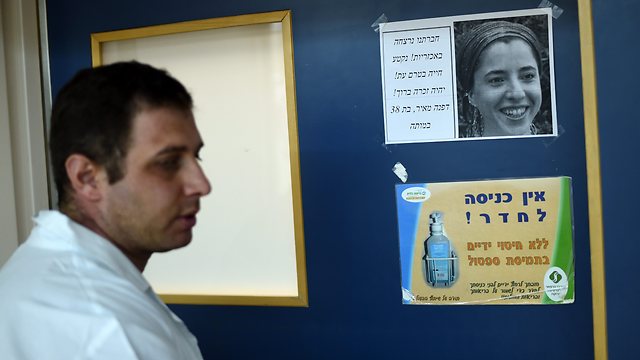
"Dafna's entire attitude towards sexuality and fertility also came from a deep spiritual place. For years she ran a blog in which she answered the most intimate questions sent by women, with simplicity and honesty. She would accompany each woman personally, knew how to handle the issues between a woman and her partner with sensitivity, and all out of enthusiasm and charm. She would sit almost every night, for at least two and a half hours, and answer phone calls and e-mails."
Natan says Dafna drew even complete strangers to her. "We'd walk into an empty store, in the most out-of-the-way street, and in minutes the place would fill up. I'd ask myself, 'Goodness, where did all of these people come from?' But that was Dafna, with unique powers of attraction."
Bennett left his phone number
Natan says that in the ten days before the attack, he spent quite a lot of time with his wife. "I got a lot of Dafna hours. I was sick and we spent a lot of time together. In the past few months she decided to work a little less so she can be with the kids more and invest time at home. She just finished redecorating all of it; only the corner with my work tools is left."On Sunday, Dafna got all of the tools out and started organizing them. I remember that I managed in the morning to thank her for keeping her curls. Every day she'd get up with a mountain of unruly and electrified hair on her head. A while ago she said she was sick of the rebellious curls and she wanted to shave her head. I begged her not to, and she kept it just for me. In general, we kept working on our relationship every day, we had 18 years of happiness, I really am grateful for every minute."
Later that morning, even though he wasn't fully recovered from his illness, Natan returned to work as the director of the yeshiva for high school students in Susya. Dafna convinced him to come home to have lunch with her, and he agreed. "I came home, we had our last meal together, and I went with Nadav to the clinic in Alon Shvut," he says. At home, Renana, Noa, Ahava and Itay were left with their mother. Akiva was at the Makor Chaim yeshiva at the time, where he received the news of his mother's death.
Shortly after lunch, the terrorist arrived at the house. "Itay was always at Dafna's heels," Natan says. "He's the only one who saw everything, but he hasn't spoken about it so far. The challenges God puts to this child."
While the murderer attacked Dafna, the rest of the children were in the rooms at the house's lower level. Renana, the eldest child, heard her mother's screams and ran up the stairs. "I saw someone leaning over her and she's fighting him with her legs. She wouldn't let him hurt us, the children, as well. I didn't feel like this was a terrorist, I didn't think about it. I screamed and he panicked from my screams. I think I also hit him out of instinct. He couldn't pull the knife out of mom, and he ran away.
"I realized mom was seriously wounded. At first I thought about pulling the knife out, but then I remembered what they taught us at Magen David Adom, not to touch foreign objects. I took Itay downstairs to be with the rest of the children and yelled at them that if they came upstairs, I'd kill them. I stayed with mom on the ground floor, glued to the phone, calling an ambulance. Her cellphone was ringing, it was dad. I didn't know what to do, so I hung up on him. After a few minutes he called again. I told him mom was wounded, but that she was okay, she was breathing. She really was breathing. I remember she took three deep breaths, with her entire body, her last."
"The incredible and wise Renana spared me," her father takes over. "On the way home I called again and again, and the entire time she told me 'mom is being treated' and hung up."
But Natan, who volunteered as an ambulance driver in the past, knew what such a long treatment meant. The news broadcast he listened to on the way made him lose whatever hope he had left. "I opened the radio. I heard there was a murder in Otniel, and I knew what that meant. When I got home, Dafna wasn't here anymore. I'm glad my memory of her is a memory of life."
"They're two righteous people, Renana and Natan, the way they functioned," says Rachel, Dafna's mother-in-law. "Natan called me from the drive home. He told me no one told him anything, but he figured it out on his own. He asked me to say 'Amen,' and started blessing 'Baruch dayan emet. The Lord has giveth and the Lord has taketh,' and then quickly added, 'And thank you for every minute.'"
Renana looks down and sweeps away an errant lock of hair from her forehead. "I know I functioned well," she says. "I kept my siblings safe, I called for help. The truth is, this isn't the first time I found myself in an emergency. Once, one of my brothers caught his hand in the door and nearly lost it. Mom has seen a lot in her line of work as a nurse, including in intensive care, but this time she lost her cool. I guess it's different when it's your son. She started screaming, so I handled the incident and called an ambulance. Maybe I learned how to act then. And still, it's very painful for me. It hurts that I couldn't help my mommy in her toughest moments.
"I also still can't grasp that it was a terrorist. That a terrorist infiltrated our home. When a fighter from the emergency squad came in and asked 'where's the terrorist?' it took me a moment to understand who he meant. I only said he escaped outside. I still feel like I'm in a move. I open Ynet and read a eulogy by some girl, Renana, 17 years old. It can't be me."
Renana is a senior at the AMIT high school in Be'er Sheva, near Soroka. "Mom always made fun of me, saying that if I skip school to go to the mall, she could see it from the hospital's balcony," she says.
This week, Renana was supposed to take the matriculation exam in math. When Education Minister Naftali Bennett came to offer his condolences, he promised her a special date will be set so she could take the test. "It's only because of you, because of your pressure, that I'm trying to take five units of math (advanced level -ed)," she accuses him and laughs. Bennett likes the sharp-tongued redhead, and leaves her his personal phone number.
For a few minutes she pulls away from the crowds and goes downstairs to her room, where she withdraws inwards to her pain, peeling away the cynicism. "Now all of the famous people are coming. But in the end it'll just be us, dad and the kids, and we'll have to rebuild our lives. This morning I filled the washing machine so we could have clean clothes after the shiva. I know I can't replace mom. I have my own life, and I won't change them. My plan is to go to prep school next year, and then enlist in the IDF. It's important to me to enlist, like mom. There are jobs in the army girls can do better than boys. I'm not a crazy feminist who will go to Caracal (combat unit with a high percentage of female fighters - ed) or something, fighting is for boys as far as I'm concerned. But it's still important for me to enlist."
Did you sometimes fight with your mom?
"Of course. Mom was my best friend. We had an open relationship, and we spoke about everything, like only mom knows how, but we also fought. That's adolescence, isn't it? On the other hand, mom never commented about my clothes or about my modesty. What good would it do to fight about this with a teenager? After all, at the end of the day, it's my decision what to wear. There was only one thing that bothered her, that I wore black clothes a lot. But mom only asked, 'Why black, Renana?' and that's it. This also isn't a house of non-stop indulgences. Mom and dad know how to demand things of the children, even the two little ones. If Nadav says 'water,' no one gives him water until he says a full sentence, properly."
What do you tell the little ones now?
"Dad spoke to them. I asked Nadav yesterday where mom was. At first he said 'in the ambulance,' and later he said 'mom is in my heart.' So sweet."
Are you afraid now?
"My dad asked us if we wanted to put bars on the windows. I don't know, I don't like it. The terrorist came through the door anyway. I had a moment when I was afraid to go brush my teeth at night, but it passed. I feel protected here in Otniel. Every person has his fate. I have a bullet-proof ride to school, but mostly I'm not afraid to ride in a normal car, or hitchhike from the settlement."
A settler with white hair
Over the past few months, Dafna was afraid. She chose to avoid taking the northern road towards Jerusalem as much as possible, and only went south towards Be'er Sheva, for work. "Dafna always made fun of the fact that it wasn't clear how she, someone who voted for Shimon Peres, got to Otniel, and said there's an agreement between us: 'Once in four years, Natan decides for me who to vote for, the rest I decide.' She really did decide everything. My luck is that in the last few years I got the privilege of deciding something in this world once every two years rather than once every four years," Natan says, with the mischievous laughter radiating from his face again, playing hide and seek with the pain and loss.
"The fear of terror was present here at home. We spoke about it and Dafna even wrote about it in the settlement's news bulletin. Since its foundation, over 10 people have been murdered in Otniel. Maybe that's why she was happy about every white hair on my head. 'A settler with white hairs is definitely an achievement,' she told me. Dafna wasn't afraid of death, she was afraid of suffering. There were a lot of jokes here about the Shin Bet's torturing. Dafna said that after they put out one cigarette on her, she will immediately admit to any crime in the world. Renana told her they didn't need a cigarette, it would be enough to blow up a balloon next to her and she will immediately admit to murdering Arlozorov. I think Dafna didn't suffer much."
The eldest daughter says her mother never took life for granted, and treated each day like it could be her last. "She tried not to postpone anything. If she wanted to paint the door, she would just do it. When there were things I'd plan for tomorrow, mom would say, 'if I wake up in the morning.' That was her life philosophy."
And Natan, he remembers the things he heard from his wife only one day before the murder. "Last Saturday she suddenly says this sentence, that was very much like her to say, half kidding, half seriously, 'It's not so bad to die.' And then we talked about how hard it is for those left behind. But Dafna is here. Her spirit and her educational way will remain here."










